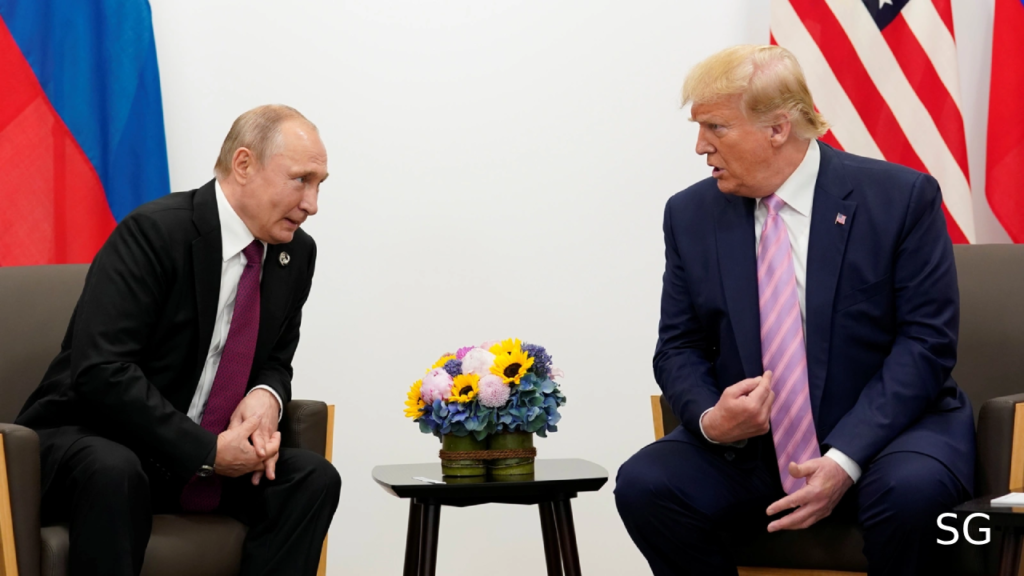Table of Contents

Trump’s New Approach to US-Russia Relations and the Ukraine War
A New Approach to the War in Ukraine
When Russian President Vladimir Putin launched his invasion of Ukraine nearly three years ago, then-U.S. President Joe Biden took a firm stand in solidarity with Kyiv, forged a bulwark of European allies, and set veteran advisers to the task of isolating Moscow economically and diplomatically.
Washington’s approach changed dramatically with the initial meeting between U.S. and Russian negotiators on Tuesday. The officials met just a month after Donald Trump returned to the White House, with Ukraine and NATO partners sidelined by a relatively inexperienced team of Trump aides and Putin granted concessions even before the talks got underway.
Trump’s push to impose an end to Russia’s war in Ukraine has raised concerns about a peace deal that could undermine Kyiv and European security while shifting the geopolitical landscape.
Direct U.S.-Russia Talks in Riyadh
The talks in Riyadh marked the first time the U.S. and Russia have met to discuss the war in Ukraine since the conflict began. The meeting resulted in an agreement to form negotiating teams for future discussions and work to restore normal diplomatic relations.
Even before the talks, European politicians criticized Trump for ruling out NATO membership for Ukraine and suggesting that Kyiv should not expect to reclaim the 20% of its territory currently under Russian control. Some labeled these moves as appeasement.
Ukraine and European Allies Excluded
The absence of Ukrainian and European representatives marked a sharp departure from the previous U.S. stance of “nothing about Ukraine without Ukraine.” Kyiv has stated that it will not accept any deal imposed without its consent.
European governments have begun discussing the possibility of contributing peacekeepers to back any agreement on Ukraine. Trump indicated he would not oppose such a deployment, though Russia has firmly rejected the idea of NATO troops being involved.
U.S. Team Lacks Experience
The Russian delegation was led by Foreign Minister Sergei Lavrov and Kremlin foreign policy aide Yuri Ushakov, both of whom have decades of diplomatic experience. The U.S. delegation, however, consisted of Secretary of State Marco Rubio, National Security Adviser Mike Waltz, and Trump envoy Steve Witkoff—officials with little prior experience in high-level international negotiations.
Critics argue that this lack of expertise may put the U.S. at a disadvantage. Some have described the talks as “amateur hour” for Trump’s national security team.
Concerns Over U.S. Strategy
Trump has insisted that his administration is pursuing a strategy of “peace through strength.” However, some reports indicate that the U.S. has proposed taking ownership of 50% of Ukraine’s critical minerals, possibly as compensation for military aid. This has led to concerns that the U.S. approach may be more transactional than strategic.
Reactions from Ukraine and Europe
Ukrainian President Volodymyr Zelensky postponed a planned visit to Saudi Arabia, reportedly to avoid legitimizing the U.S.-Russia talks. Additionally, tensions have risen over a proposed U.S.-Ukraine minerals deal, which some have compared to extortion.
Several European and U.S. officials have warned that Russia has not signaled any willingness to make concessions. Intelligence sources suggest that Putin remains committed to holding all occupied Ukrainian territories and may have long-term ambitions to expand further into Europe.
Assessing the Impact of the Talks
While some analysts argue that limiting initial negotiations to the U.S. and Russia could streamline discussions, others believe that the exclusion of Ukraine and NATO has already handed Moscow a diplomatic victory.
The broader concern remains whether any agreement negotiated under these conditions will lead to a lasting peace or simply embolden Russia to push its ambitions further into Europe. The geopolitical consequences of these talks will likely shape international relations for years to come.
“Trump’s New Approach to US-Russia Relations and the Ukraine War” “Trump’s New Approach to US-Russia Relations and the Ukraine War” “Trump’s New Approach to US-Russia Relations and the Ukraine War” “Trump’s New Approach to US-Russia Relations and the Ukraine War” “Trump’s New Approach to US-Russia Relations and the Ukraine War” “Trump’s New Approach to US-Russia Relations and the Ukraine War”